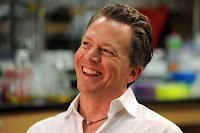Geron to begin stem cell trial for spinal cord injury
 |
| Hans Keirstead, UC Irvine |
The FDA has lifted a clinical hold that has been in place since 2008 on Menlo Park, CA-based Geron’s proposed trial for spinal cord injury. The multi-center phase I trial will be the world’s first trial of a therapy based on embryonic stem cells.
In a press release, the company’s president and CEO, Thomas Okarma, said:
“Our goals for the application of GRNOPC1 in subacute spinal cord injury are unchanged – to achieve restoration of spinal cord function by the injection of hESC-derived oligodendrocyte progenitor cells directly into the lesion site of the patient’s injured spinal cord.”
Alan Trouson, CIRM President, said:
“This is an important milestone for the whole field to have an embryonic stem cell therapeutic in clinical trials. We are looking with hope and expectation that the transplant will be safe and effective.”
The trial is based on work by CIRM grantee Hans Keirstead at UC Irvine. Prior to CIRM funding, his team matured embryonic stem cells into a form of neuronal cell called oligodendrocytes. When injected into rats with spinal cord injury, those cells protected the remaining spinal cord neurons and allowed the rats to walk.
In their press release, Geron described the reasons for the clinical hold:
The clinical hold was placed following results from a single preclinical animal study in which Geron observed a higher frequency of small cysts within the injury site in the spinal cord of animals injected with GRNOPC1 than had previously been noted in numerous foregoing studies.
In follow up work, Geron was able to prove to the FDA the safety of their stem cell product. The work directly leading to this clinical trial took place prior to the passage of proposition 71 to create CIRM. CIRM has funded follow-up work by Keirstead and others to improve on this potential therapy and expand the application of these cells to other diseases.
Here is Hans Keirstead discussing the long path from basic research to this clinical trial:
A.A.
